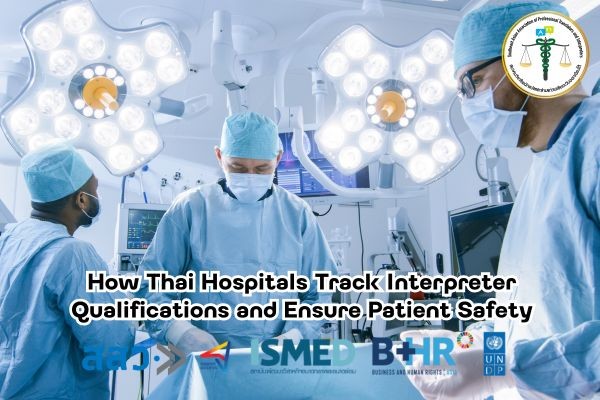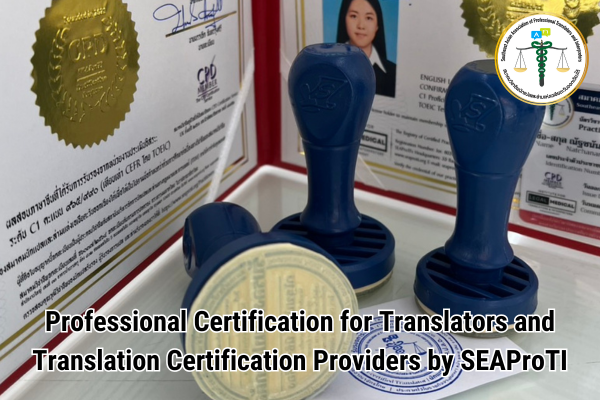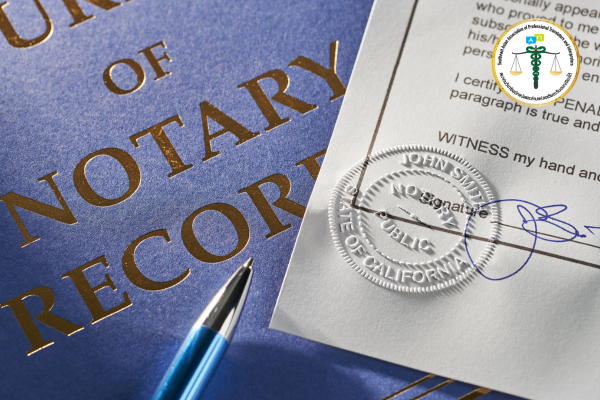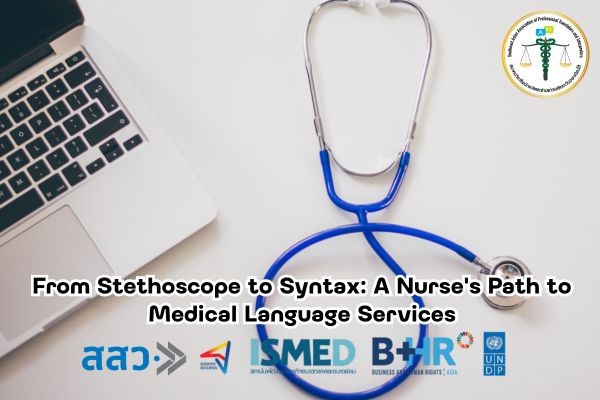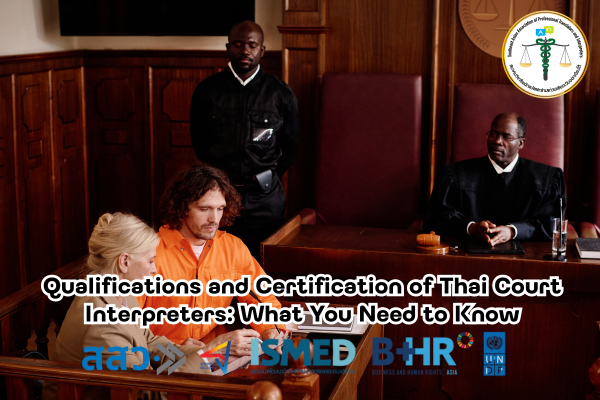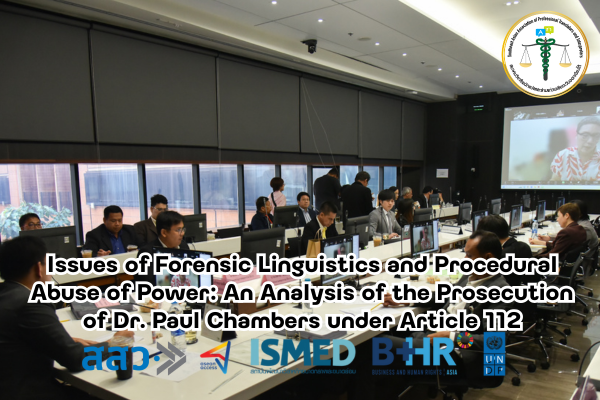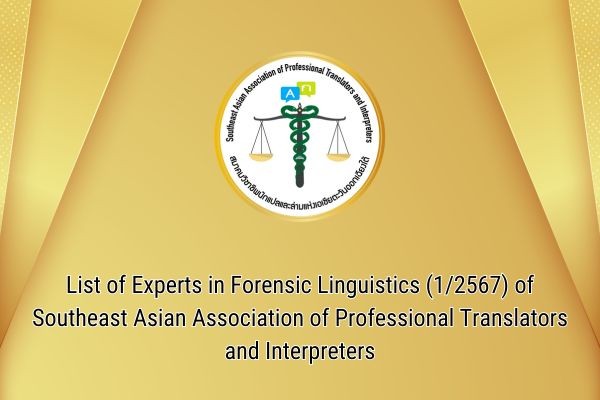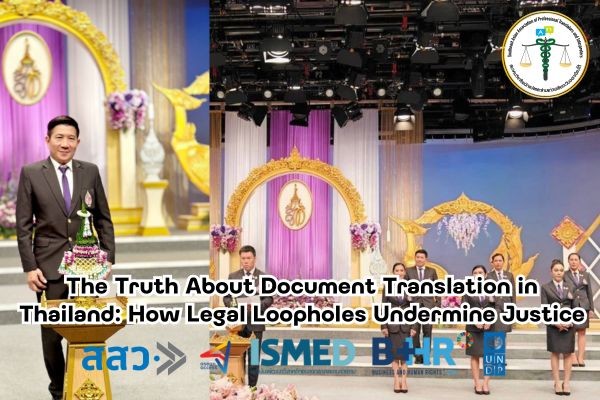How Thai Hospitals Track Interpreter Qualifications and Ensure Patient Safety
21 April 2025, Bangkok – Effective communication is vital in healthcare, and qualified interpreters play a key role in ensuring patients understand their diagnosis, treatment options, and medical instructions. In Thailand, hospitals implement several strategies to manage the qualifications and performance of their interpreters, though gaps remain. Here’s how interpreter qualifications are tracked, and what patients should know:
1. Formal Training and Certification
-
Some professional interpreters in Thai hospitals hold recognized certifications, such as in community interpreting or medical interpreting. These certificates demonstrate proven competence in language proficiency, medical terminology, and ethical practice.
-
Patients are encouraged to request interpreters with certificates issued by the Southeast Asian Association of Professional Translators and Interpreters (SEAProTI). This is currently the only recognized body in Thailand for certifying interpreters to international standards.
-
Unfortunately, hospitals with limited budgets may not provide certified interpreters, putting patient safety at risk. It is a basic human right to request a certified interpreter, and hospitals are obliged to provide one when needed.
2. Continuous Training and Professional Development
-
Some hospitals organize workshops and refresher courses to deepen interpreters’ medical and cultural knowledge.
-
However, ongoing training alone is not enough. Interpreters must be certified by a third-party organization, such as SEAProTI. Only certified interpreters are held accountable through codes of conduct and ethics—something internal hospital training cannot guarantee.
3. Use of Certified Interpreter Teams or Agencies
-
Hospitals often collaborate with certified interpretation agencies or contract directly with SEAProTI-accredited interpreters.
-
These agencies maintain internal quality assurance systems, including regular evaluations, client feedback, and documentation of qualifications, ensuring interpreters are equipped to handle sensitive and complex medical communication.
4. Documentation and Credential Tracking
-
Hospitals are required to document interpreter qualifications, experience, and training history through their HR or contractor systems.
-
Patients have the right to ask the hospital to show the interpreter’s credentials or verify them directly with the interpreter before the session begins.
5. Integration with Public Health Programs
-
Some public hospitals use interpreters trained under the Migrant Health Worker (MHW) or Migrant Health Volunteer (MHV) programs.
-
These interpreters receive targeted training, and their competencies are monitored to ensure they can support language access for migrant patients. Patients can ask whether their hospital participates in these programs.
6. Technology-Enabled Interpretation (Tele-Interpretation)
-
A growing number of hospitals use tele-interpretation services, including video or voice links to certified remote interpreters.
-
These interpreters are vetted by the service provider, and their credentials are typically easier to verify. This approach increases access to certified interpreters in areas where onsite professionals are unavailable.
Final Note: Protecting Your Health and Rights
In Thailand, only SEAProTI provides official certification for interpreters at the international level. To ensure your health, safety, and legal protection:
- Always request a certified interpreter from SEAProTI when receiving medical care.
- Ask to see interpreter credentials before the session.
- Report any concerns to hospital management or directly to SEAProTI.
Certified interpreters don’t just speak your language—they protect your rights, dignity, and health.
SEAProTI’s certified translators, translation certification providers, and certified interpreters:
The Southeast Asian Association of Professional Translators and Interpreters (SEAProTI) has officially announced the criteria and qualifications for individuals to register as “Certified Translators,” “Translation Certification Providers,” and “Certified Interpreters” under the association’s regulations. These guidelines are detailed in Sections 9 and 10 of the Royal Thai Government Gazette, issued by the Secretariat of the Cabinet under the Office of the Prime Minister of the Kingdom of Thailand, dated July 25, 2024, Volume 141, Part 66 Ng, Page 100.
To read the full publication, visit: the Royal Thai Government Gazette
วิธีที่โรงพยาบาลในประเทศไทยติดตามคุณสมบัติของล่ามและปกป้องความปลอดภัยของผู้ป่วย
21 เมษายน 2568, กรุงเทพมหานคร – การสื่อสารที่มีประสิทธิภาพในสถานพยาบาลเป็นสิ่งสำคัญอย่างยิ่ง โดยเฉพาะอย่างยิ่งเมื่อต้องอาศัยล่ามในการอธิบายการวินิจฉัย การรักษา และคำแนะนำทางการแพทย์ การมีล่ามที่มีคุณวุฒิและเชี่ยวชาญจึงเป็นปัจจัยสำคัญที่ช่วยลดความเสี่ยงจากการเข้าใจผิด ซึ่งอาจส่งผลกระทบต่อชีวิตผู้ป่วยโดยตรง
ในประเทศไทย โรงพยาบาลมีมาตรการหลากหลายในการคัดเลือกและติดตามล่ามที่มีคุณภาพ แม้จะยังมีช่องว่างอยู่บ้างก็ตาม ต่อไปนี้คือแนวทางที่ใช้กันอยู่ในปัจจุบัน พร้อมข้อแนะนำที่ผู้ป่วยควรรู้:
1. การฝึกอบรมอย่างเป็นทางการและใบรับรองคุณวุฒิ
-
ล่ามมืออาชีพบางรายในโรงพยาบาลมีใบรับรองจากการผ่านการฝึกอบรมด้านการล่ามชุมชนหรือการล่ามทางการแพทย์ ซึ่งแสดงถึงความสามารถในการใช้ภาษา ความเข้าใจในศัพท์แพทย์ และจริยธรรมในการล่าม
-
ผู้ป่วยควรร้องขอให้ใช้ล่ามที่มีใบรับรองจาก สมาคมวิชาชีพนักแปลและล่ามแห่งเอเชียตะวันออกเฉียงใต้ (SEAProTI) ซึ่งเป็นองค์กรเดียวในประเทศไทยที่ให้การรับรองล่ามตามมาตรฐานสากล
-
อย่างไรก็ตาม โรงพยาบาลบางแห่งที่มีงบประมาณจำกัดอาจไม่สามารถจัดหาล่ามที่ได้รับการรับรองได้ ซึ่งอาจก่อให้เกิดอันตรายต่อสุขภาพผู้ป่วยได้โดยตรง การได้รับบริการจากล่ามที่ผ่านการรับรองถือเป็น สิทธิขั้นพื้นฐานของผู้ป่วยและโรงพยาบาล มีหน้าที่ต้องจัดหาให้
2. การอบรมและพัฒนาทักษะอย่างต่อเนื่อง
-
โรงพยาบาลบางแห่งจัดอบรมเพิ่มเติมให้ล่ามในด้านคำศัพท์ทางการแพทย์และความเข้าใจด้านวัฒนธรรม เพื่อให้สามารถให้บริการได้อย่างมีประสิทธิภาพยิ่งขึ้น
-
อย่างไรก็ตาม การอบรมภายในองค์กรไม่สามารถทดแทน การรับรองจากหน่วยงานภายนอก ได้ ล่ามที่ได้รับการรับรองจะต้องปฏิบัติตามจรรยาบรรณและมาตรฐานวิชาชีพ ซึ่งสามารถตรวจสอบได้จากองค์กรที่รับรอง เช่น SEAProTI เท่านั้น
3. การใช้หน่วยงานหรือทีมล่ามที่ได้รับการรับรอง
-
โรงพยาบาลหลายแห่งว่าจ้างล่ามจากหน่วยงานที่มีทีมล่ามที่ได้รับการรับรองและมีประสบการณ์ในการให้บริการในสถานพยาบาล
-
หน่วยงานเหล่านี้มีกระบวนการควบคุมคุณภาพภายใน เช่น การประเมินผล การให้ข้อเสนอแนะ และการเก็บประวัติคุณสมบัติของล่ามอย่างเป็นระบบ
4. การเก็บบันทึกคุณสมบัติและประวัติการทำงาน
-
โรงพยาบาลมีระบบในการบันทึกข้อมูลคุณสมบัติ ประวัติการอบรม และประสบการณ์ของล่ามไว้ในฐานข้อมูลของฝ่ายบุคคลหรือระบบบริหารจัดการผู้ให้บริการ
-
ผู้ป่วยสามารถ ร้องขอให้โรงพยาบาลแสดงหลักฐานหรือใบรับรองของล่ามได้ เพื่อความมั่นใจว่าได้รับบริการจากผู้ที่มีคุณสมบัติเหมาะสม
5. การบูรณาการกับโครงการสาธารณสุขสำหรับแรงงานข้ามชาติ
-
โรงพยาบาลของรัฐบางแห่งมีการใช้ล่ามที่ได้รับการฝึกอบรมภายใต้โครงการ อาสาสมัครสาธารณสุขแรงงานข้ามชาติ (MHV) หรือ ผู้ช่วยสาธารณสุขแรงงานข้ามชาติ (MHW)
-
ล่ามในโครงการเหล่านี้จะได้รับการฝึกอบรมเฉพาะด้าน และมีการติดตามประเมินสมรรถนะในการให้บริการสื่อสารแก่ผู้ป่วยต่างชาติอย่างใกล้ชิด ผู้ป่วยสามารถสอบถามได้ว่าโรงพยาบาลที่เข้ารับการรักษามีการใช้ล่ามจากโครงการนี้หรือไม่
6. การใช้เทคโนโลยีการล่ามทางไกล (Tele-Interpretation)
-
โรงพยาบาลบางแห่งเริ่มใช้ระบบล่ามทางไกล เช่น วิดีโอคอลกับล่ามที่ได้รับการรับรองจากผู้ให้บริการมืออาชีพ
-
ล่ามทางไกลเหล่านี้มักมีการตรวจสอบคุณสมบัติอย่างรอบคอบ และสามารถให้บริการได้อย่างรวดเร็วแม้ในพื้นที่ที่ไม่มีล่ามอยู่ประจำ
หมายเหตุสำคัญ: ปกป้องสุขภาพและสิทธิของคุณ
ในประเทศไทย มีเพียง SEAProTI เท่านั้น ที่ให้การรับรองล่ามอย่างเป็นทางการตามมาตรฐานระดับสากล หากคุณเป็นผู้ป่วยหรือญาติที่ต้องการความเข้าใจที่ถูกต้องในการรักษา:
- ขอใช้บริการจากล่ามที่ได้รับการรับรองจาก SEAProTI เท่านั้น
- สอบถามและตรวจสอบใบรับรองของล่ามก่อนเริ่มใช้บริการ
- หากพบปัญหา แจ้งต่อโรงพยาบาลหรือรายงานต่อ SEAProTI โดยตรง
ล่ามที่ผ่านการรับรองไม่ใช่เพียงแค่คนแปลภาษา แต่เป็นผู้ปกป้องสิทธิ ความปลอดภัย และศักดิ์ศรีของคุณในฐานะผู้ป่วย
เกี่ยวกับนักแปลรับรอง ผู้รับรองการแปล และล่ามรับรองของสมาคมวิชาชีพนักแปลและล่ามแห่งเอเชียตะวันออกเฉียงใต้
สมาคมวิชาชีพนักแปลและล่ามแห่งเอเชียตะวันออกเฉียงใต้ (SEAProTI) ได้ประกาศหลักเกณฑ์และคุณสมบัติผู้ที่ขึ้นทะเบียนเป็น “นักแปลรับรอง (Certified Translators) และผู้รับรองการแปล (Translation Certification Providers) และล่ามรับรอง (Certified Interpreters)” ของสมาคม หมวดที่ 9 และหมวดที่ 10 ในราชกิจจานุเบกษา ของสำนักเลขาธิการคณะรัฐมนตรี ในสำนักนายกรัฐมนตรี แห่งราชอาณาจักรไทย ลงวันที่ 25 ก.ค. 2567 เล่มที่ 141 ตอนที่ 66 ง หน้า 100 อ่านฉบับเต็มได้ที่: นักแปลรับรอง ผู้รับรองการแปล และล่ามรับรอง


